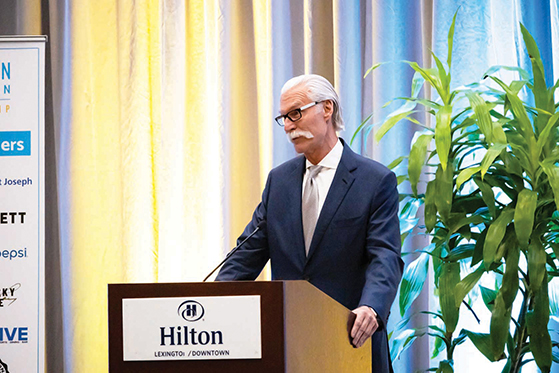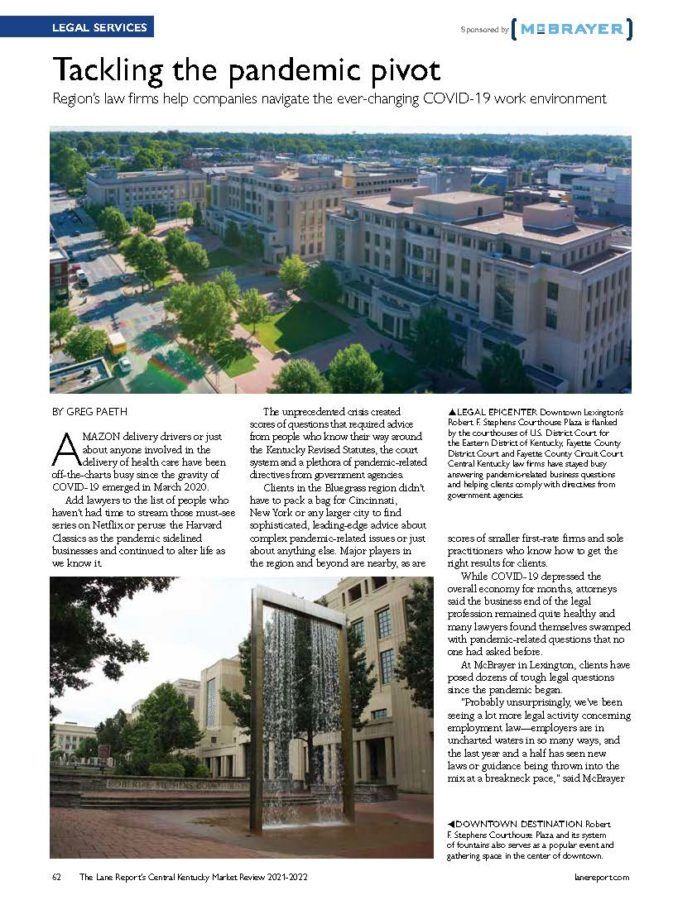
(CENTRAL KY. MARKET REVIEW) — Amazon delivery drivers or just about anyone involved in the delivery of health care have been off-the-charts busy since the gravity of COVID-19 emerged in March 2020.
Add attorneys at Lexington legal firms to the list of people who haven’t had time to stream those must-see series on Netflix or peruse the Harvard Classics as the pandemic sidelined businesses and continued to alter life as we know it.
The unprecedented crisis created scores of questions that required advice from people who know their way around the Kentucky Revised Statutes, the court system and a plethora of pandemic-related directives from government agencies.
Clients in the Bluegrass region didn’t have to pack a bag for Cincinnati, New York or any larger city to find sophisticated, leading-edge advice about complex pandemic-related issues or just about anything else. Major players in the region and beyond are nearby, as are scores of smaller first-rate firms and sole practitioners who know how to get the right results for clients.

While COVID-19 depressed the overall economy for months, Lexington legal firms said the business end of the legal profession remained quite healthy and many lawyers found themselves swamped with pandemic-related questions that no one had asked before.
At McBrayer in Lexington, clients have posed dozens of tough legal questions since the pandemic began.
“Probably unsurprisingly, we’ve been seeing a lot more legal activity concerning employment law—employers are in uncharted waters in so many ways, and the last year and a half has seen new laws or guidance being thrown into the mix at a breakneck pace,” said McBrayer attorney Jaron P. Blandford. “It started with issues concerning lockdown and the impact on wage and hour issues, then it became more about leave and medical inquiries concerning COVID-19, and now we’re seeing questions concerning vaccines, including whether employers can ask about them (yes) or require them (also yes). It has been a challenging time for employers.”
And when it comes to employment issues, there is no “one-size-fits-all” response, he said.
“You really have to operate on a case-by-case basis, especially in these times when nothing is like what you knew before and everything could change on a dime,” Blandford said.
McBrayer attorney Stephen G. Amato agreed that business clients have posed many unique questions in recent months.
“We’ve been handling a lot of issues for businesses of all kinds. Everyone is feeling the economic effects of the pandemic in one way or another,” Amato said. “Hospitality, for instance, is an industry that has experienced a lot of upheaval throughout the last year and a half—a lot of liquor laws were temporarily changed in the early lockdowns, and some have been altered permanently. Our job is to help our clients keep up.”
Labor shortages and safety
COVID-19 challenges have affected businesses of all sizes in a variety of ways, said P. Branden Gross, managing partner of Dentons Bingham Greenebaum in Lexington.
“Our clients are concerned about how to safely bring employees back to work. Some are facing labor shortages as well as supply chain issues. In addition to working with our clients to solve those issues, we have created in-depth resources addressing return-to-work and supply chain resilience, among other topics,” he said.
The pandemic-related challenges were on top of the typical labor and employment concerns that businesses face, such as the Employee Retirement Income Security Act, Family Medical Leave Act, workers’ compensation and litigation, Gross said.
The firm also has assembled a defense team for clients facing Small Business Administration audits and Department of Justice investigations about loans and grants they received from the federal government during the height of the pandemic, said Gross, a veteran attorney with Bingham Greenebaum Doll two years ago when it merged into Dentons, which is one of the world’s largest law firms.
Jan de Beer, member-in-charge of the Lexington office of Frost Brown Todd, said his firm also has faced plenty of pandemic-related issues.
“About a year and a half ago they (our attorneys) were dealing with and analyzing what essential work was—what the likelihood was to keep people in the office or in the factories,” de Beer said. “Now the question has really changed to the idea of what kind of vaccination mandate—if any—can they have? Can they do what Delta did with a $200 surcharge?”

Not long ago, Delta Air Lines said employees who opted not to be vaccinated against COVID-19 would be required to pay an additional $200 a month for company-sponsored health insurance in an effort to offset costs for employees who might be hospitalized with the virus.
“The challenge faced by the modern American employer for labor in this environment is something that is a hot-button issue … with what employers can do with COVID-19 requirements with regard to vaccinations, office plans, remote work,” de Beer said.
At Stites & Harbison in Lexington, “discussions about employment law issues have been a main priority to clients since the pandemic started,” said Cassidy Rosenthal, executive member of the firm. “However, most of those discussions have been centered on COVID-19 protocols, policies and guidance.”
A variety of topics in the “staffing shortages” category also have demanded attention from her firm, she said.
Like all Lexington firms, Rosenthal said Stites & Harbison’s practice involves far more than responses to pandemic-related issues.
“Our real estate and commercial lending, intellectual property, data privacy and security, health care, construction, mergers and acquisitions, environmental, and trust and estates practices are all busy right now,” she said. “We expect these groups to remain very busy for the foreseeable future.”
Tech pivot productive, and it creates questions
One lasting result of the pandemic may prove to be the use of more technology rather than scheduling in-person hearings and conferences that were, in some cases, verboten when the pandemic was at its worst. It has now become commonplace for hearings, expert testimony and depositions to be handled remotely, said de Beer of Frost Brown Todd.
The Fayette County Bar Association, which has nearly 1,100 members, launched a podcast in 2019 in which attorneys provided answers to some of the most common questions that that flow into the association’s office, according to Dana Arnold, executive director of the organization.
Some frequently asked questions on the Central Kentucky Lawyer Referral Service podcast involve “lemon laws” for vehicles, grandparents’ rights and the cost of a divorce, the association said.
“Cybersecurity and data privacy are becoming even more important as companies shift workforces to remote work, and as bad actors seek to take advantage of potential vulnerabilities,” said Gross, who oversees Dentons in Lexington.
“Remote work” is far more than an abstract concept for the firm.
 “When the pandemic hit, our offices had to adjust how and where we work in order to keep our clients and attorneys safe. We pivoted to operating mostly remotely, until recently, although our attorneys have been able to work in the office since late spring of 2020. Over the last couple of months, our attorneys and staff have been returning to the office with the goal of a full office return. With that said, the pandemic has shown us that we can use flexible schedules to accommodate the needs of our clients and team members,” Gross said.
“When the pandemic hit, our offices had to adjust how and where we work in order to keep our clients and attorneys safe. We pivoted to operating mostly remotely, until recently, although our attorneys have been able to work in the office since late spring of 2020. Over the last couple of months, our attorneys and staff have been returning to the office with the goal of a full office return. With that said, the pandemic has shown us that we can use flexible schedules to accommodate the needs of our clients and team members,” Gross said.
Some Central Kentucky firms have made recent additions to their staffs.
Rosenthal said Stites & Harbison was “…very fortunate to have the attorneys of the intellectual property boutique, King & Schickli, join the Lexington office in July of this year. We have one of the largest IP practices in the state and the addition of these four stellar attorneys better positions the firm to have the premiere intellectual property practice across the commonwealth.”
Gross at Dentons was equally enthusiastic about the addition of Robin Thomerson, who rejoined the firm as a partner.
“She focuses her practice on environmental law, which is a complex and ever-evolving area of law. Her previous experience with regulatory agencies gives her a unique perspective when helping clients and addressing their business and legal needs,” Gross said.
At McBrayer, managing member James H. Frazier III said the loss of founder Terry McBrayer in October 2020 “…is still deeply felt by our firm.”
McBrayer, who died of cancer at age 83, had been the firm’s “rainmaker” for many years, the insider’s insider in state government and the Democratic Party when Democrats were dominant in the state.
Despite that loss, Frazier said, “we’ve been fortunate that our firm and practice areas have continued to grow in these turbulent times. We’ve welcomed several new attorneys over the past year and a half, and they’ve contributed a great deal to both the professional capacity and collegial atmosphere of our firm. Even amidst uncertainty, we’ve been able to grow our practice.”
Click the image below to see the full story, photos and advertiser messages.
Click here for more Kentucky business news.




















